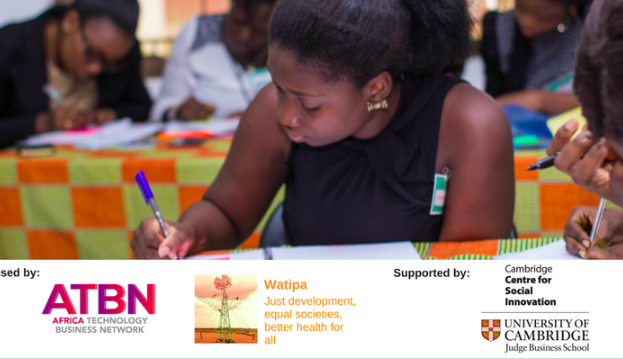
UNLOCKING POTENTIAL: Driving Gender Equality in Africa Through Education, Technology & Enterprise
Africa Technology Business Network (ATBN) and Watipa with support from Cambridge Social Ventures would like to invite you to join us in Cambridge for an evening of expert discussion, new ideas and networking.
Gender inequality continues to remain a challenge all over the world, and particularly in Africa, it poses one of the biggest barriers to economic, social and national development.
Women are now emerging as leaders to drive much needed change on the continent. From developing innovative solutions with technology, to setting up high impact businesses, to stepping up to political leadership positions, women are playing a central role in driving development and achieving gender equality in Africa.
Young people can be the change they want to see in the world. It’s just that in many African countries, young leaders do not always have the means to continue with their education and reach their potential. This is especially true for young women and girls who face challenges in being supported through their education, or supporting themselves and others who may depend on them, while they pursue their dreams.
At this event, we’ll hear from a number of individuals and organisations who are working to support female empowerment in Africa and nurture the next generation of African women leaders.
There will be a panel discussion, Questions and Answers, and time for networking with a diverse and multi-disciplinary audience from the Cambridge community of academics, activists, entrepreneurs, students and residents with a common interest in women’s empowerment and development in Africa.
Panellists include:
Naana Otoo-Oyortey MBE – Executive Director of the Foundation for Women’s Health Research and Development (FORWARD)
Naana is a social activist and women’s rights defender who is passionate about building young women’s leadership and voice, and giving them access to tools to research their situation and develop their skills as change agents. She is the Executive Director of FORWARD ( http://www.forwarduk.org.uk), an African Diaspora women-led campaign and support non for profit organisation which strives to advance and safeguard the sexual and reproductive health and rights of African girls and women globally, particularly focusing on female genital mutilation (FGM), child marriage and obstetrics.
Liliana Biglou – Former Director British Council Ghana and Social Impact Consultant
Liliana is a transformational leader with a strong passion for innovation, skills and enterprise. She has spent 10 years in sub-Saharan Africa, including Malawi, Kenya and Ghana and has working experience of Uganda and Mauritius. The focus of her work has been on youth empowerment and creating opportunities for disadvantaged young people, particularly young women, through education, entrepreneurship and innovation
Eunice Baguma Ball – Founder and Executive Director, Africa Technology Business Network
Eunice is a technology inclusion and African women in tech advocate. She is the Founder and Executive Director of the Africa Technology Business Network (www.africatbn.com), a social enterprise working to empower African entrepreneurs to innovate solutions to Africa’s challenges by providing them with access to global networks and expertise. One of their key initiatives is #HerFutureAfrica, a programme that equips young African female entrepreneurs with skills, networks and mentorship to enable them build high-impact, tech-enabled businesses that create change in their communities
Lucy Stackpool-Moore – Founder and Director, Watipa
Lucy is a gender, human rights, HIV, public health and communications specialist, with experience in different developed and developing countries around the world. She is the founder and director of Watipa (www.watipa.org), a social enterprise working to enable equal societies, just development, and equal health for all. Their work includes a youth development programme that provides scholarships and mentorship opportunities to young leaders in developing countries with a particular focus on girls.





